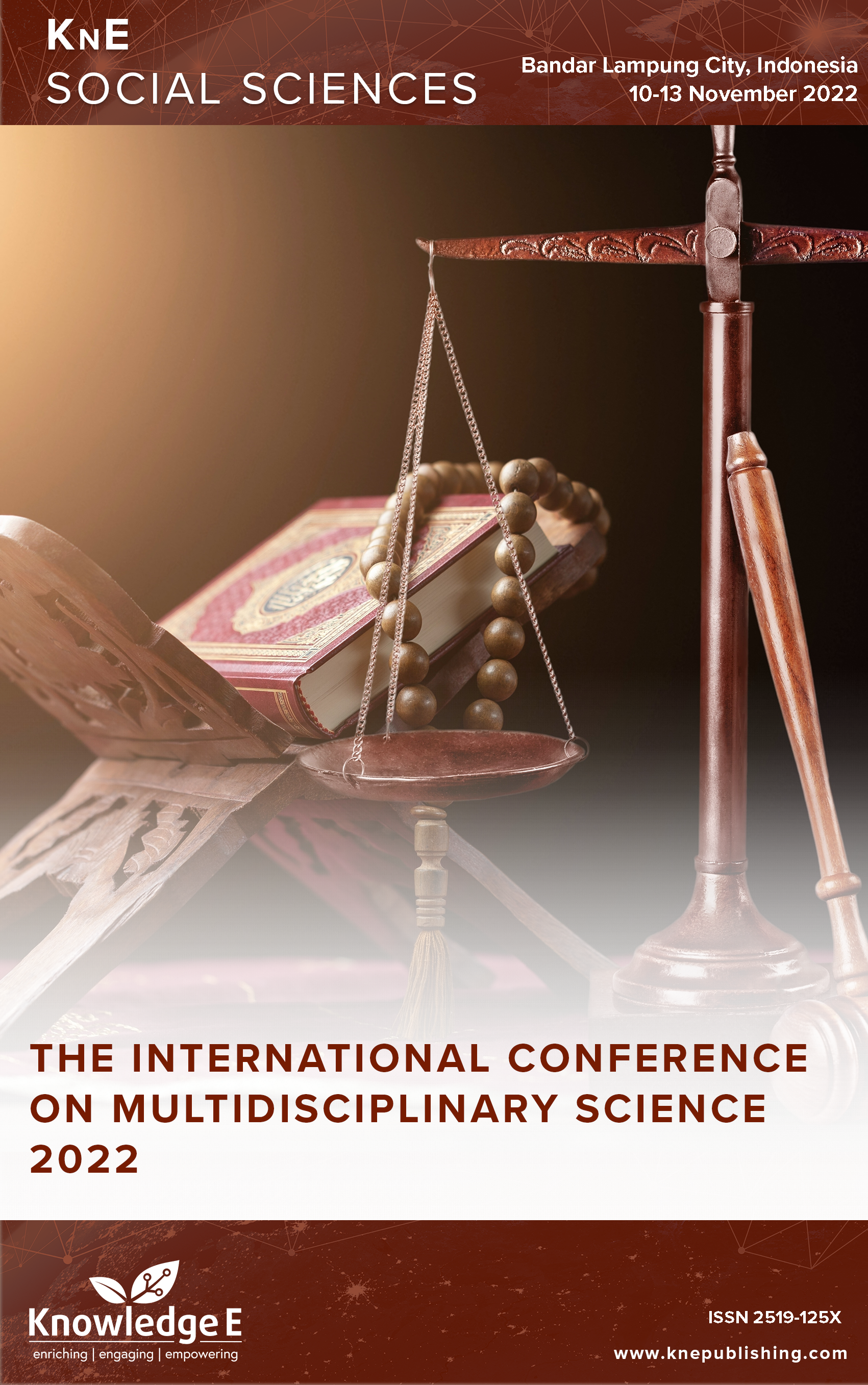Conflict Management in Indonesia Through Religious Moderation
DOI:
https://doi.org/10.18502/kss.v8i16.14041Abstract
The nature of humans as social beings needs other people, but in their interactions, disputes and disagreements often occur, leading to conflict. Indonesian society, which is plural, with various tribes, customs, religions, and cultures side by side, has the potential to cause conflict. The community increasingly needs awareness and understanding of cultural diversity, especially religion; in this case, the religious moderation movement needs to be increased. This research aims to discuss conflict management in Indonesia through religious moderation. The method used in this research is descriptive qualitative, using a literature study to obtain data. The theoretical approach used in this study uses Thomas and Kilmann’s conflict management style theory. The results of this study showed that, first, religious moderation is an understanding of the nature of religious teachings that uphold human dignity and advance public welfare based on the principles of justice, balance, and adherence to the constitution as a national agreement. Second, conflict management through religious moderations can play a significant role in reducing conflicts, such as the cases of Ahok and FPI, by offering insight on how to interpret texts and understand good texts while at the same time offering negative sentiments toward destructive groups who view the religion of the texts rigidly so that it can reduce the turmoil of religious expression on the interpretation of the text.
Keywords: conflict, religious moderation, conflict management
References
Abou El Zalaf A. The Muslim brotherhood and state repression in Egypt: A history of secrecy and militancy in an Islamist Organization. Bloomsbury Publishing; 2022.
Akhmadi A. Moderasi Beragama Dalam Keragaman Indonesia Religious Moderation in Indonesia’S Diversity. Jurnal Diklat Keagamaan. 2019;13(2):45–55.
Arifinsyah A, Andy S, Damanik A. The urgency of religious moderation in preventing radicalism in Indonesia. ESENSIA: Jurnal Ilmu-Ilmu Ushuluddin. 2020;21(1):91–108.
Chofifah UN. -Implementation of religious values and cultural values in religious moderation through the Tumpeng tradition. 2022;1(1).
DiPaolo J. The fragile epistemology of fanaticism. In higher-order evidence and moral epistemology (pp. 217–235). Routledge; 2020.
Gamin, Nugroho B, Kartodiharjo H, Kolopaking LM, Boer R. Menyelesaikan Konflik Penguasaan Kawasan Hutan Melalui Pendekatan Gaya Sengketa Para Pihak Di Kesatuan Pengelolaan Hutan Lakitan. Jurnal Analisis Kebijakan Kehutanan. 2014;11(1):71–90. https://doi.org/10.20886/jakk.2014.11.1.71-90
Habibal O. Evolution of international peace and conflict resolution studies. Int J Soc Sci Res Rev. 2019:2(3):8–17.
Hadi AT. Multicultural education: An effort to prevent religious radicalism
Ibrahim PS, Warsono. Pandangan Anggota Lembaga Bhineka Surabaya Tentang Ucapan Basuki Tjahaya Purnama di Kepulauan Seribu Yang di Anggap Menistakan Agama. Kajian Moral Dan Kewarganegaraan. 2017;05(02):0–216.
JW C. Research Design, Pendekatan Kualitatif, Kuantitatif dan Mixied. Pustaka Pelajar.
Kementerian Agama RI. Tanya Jawab Moderasi Beragama. 2019.
Kurniawan AW, Puspitaningtyas Z. Metode penelitian kuantitatif. PANDIVA BUKU. 2016.
Loshitzky Y. Chapter six forbidden love in the holy land: Transgressing the Israeli- Palestinian conflict. In Identity Politics on the Israeli Screen (pp. 112–153). The University of Texas Press; 2021.
MA R, SB L. Manajemen konflik organisasi untuk menjaga komitmen dalam Unit Kegiatan Selam 387 Universitas Diponegoro. Interaksi Online. 2020;8(1):202–232.
NS. Sosiologi Konflik: Teori-te-ori dan Analysis. Prenada Group. 2009.
NS. Tata kelola konflik demokrasi: Kasus tata kelola konflik di Aceh. Global Strategis. 2011;5(1):15–31.
Nafi’a I, Gumiandari S. Islamic moderation education in the concepts of Wahdat al-Wujud and Wahdat say-Syuhud. Jurnal Penel
Pektas S. A comparative analysis of three Sunni Muslim organizations on ’moderate and ’radical Islam in Egypt, Morocco, and Indonesia. Religion. 2021;51(2):190–213.
Pohan M. Konflik Agama dan Upaya Mewujudkan Perdamaian. 2017. Artikula.Id. https://artikula.id/muslim/konflik-agama-dan-upaya-mewujudkan-perdamaian/
Rusdiana. Manajemen Konflik. Pustaka Setia. 2019.
Salim L. Manajemen Konflik Berbasis Kearifan Lokal Teori Analisis dan Praktik. Pustaka Aksara. 2022.
Salim L, Ruslan I. Muakhi culture as ethnic conflict management in Lampung Budaya, muakhi sebagai manajemen konflik etnis di Lampung. J Sosiologi Dialektika. 2021;16(Budianto 2020):117–128.
Sauki M. Diskursus Wacana Keagamaan Pasca Aksi 212 Di Indonesia. Eduprof : Islamic Educ J. 2(1):54–75. https://doi.org/10.47453/eduprof.v2i1.31
Setia P, Rahman MT. We are socializing religious moderation and peace in the Indonesian landscape. Jurnal Iman Dan Spiritualitas. 2022;2(3):333–340.
Shihab MQ. Wasathiyyah, wawasan Isam tentang Moderasi Beragama. Lentara Hati. 2019.
Stollznow K. On the offensive: Prejudice in language past and present. Cambridge University Press; 2020.
Subchi I, Zulkifli Z, Latifa R, Sa’diyah S. Religious moderation in Indonesian Muslims. Religions. 2022;13(5):451.
Sudarmanto E, Sari DP, Tjahjana D, Mardiana SEW, BonarajaSS, Purba P, Irdawati S, Tjiptadi DD, Kato SI, Rosdiana Manalu NV, SN A. Manajemen Konflik. In Leadership:Jurnal Mahasiswa, Manajemen Pendidikan Islam (Vol. 2, Issue 2). Yayasan Kita Menulis. 2021. https://doi.org/10.32478/leadership.v2i2.720
Sulaiman S, Imran A, Hidayat BA, Mashuri S, Reslawati R, Fakhrurrazi F. Moderation between religion in era Society 5.0 and multicultural society: Studies based on legal, religious, and social reviews. Linguistics and Culture Review. 2022;6(S5):180–193.
Thomas-Kilmann Model. Quick start. 2016.
Ummah AH. The voices of
WS. Tipologi dan tata kelola resolusi konflik di tinjau dari perspektif teori sosial konflik. Teosofi. 2016;6(2):275–299.
Yanti BZ, Witro D. Islamic moderation is a resolution of different conflicts of religion. Andragogi: Jurnal Diklat Teknis Pendidikan Dan Keagamaan. 2020;8(1):446–457.

